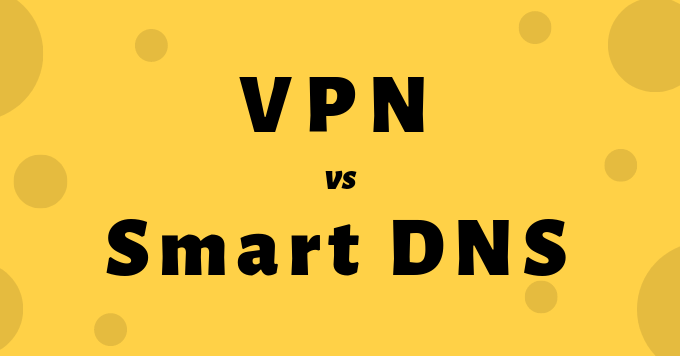In this day and age, who still uses a vanilla internet connection? You do? Well, don’t feel too bad about it. Most people are blissfully unaware of their options when it comes to modifying their internet connections for better safety, privacy or expanded capabilities.
However, if you do want to hide your internet activities or perform geo-unblocking of locked content, there are a few options on offer that might be a little confusing to total newcomers. Terms like “VPN” and “Smart DNS” are thrown around with gay abandon.
These technologies have some superficial similarities, but work in fundamentally different ways. If you end up using the wrong technology for your needs, it can have some serious consequences. So let’s demystify the acronyms and settle any doubts you may have. If you want to know the difference between a VPN and a Smart DNS, you’re about to hit paydirt!
VPNs and Smart DNS Services – The Basics
The term “VPN” is short for Virtual Private Network. It’s a technology that creates a protected “tunnel” through the internet. Connecting two computers as if they were on the same local network. That’s very different from how the internet usually works.

Internet technology transmits data as “packets”, which are then routed over the millions of interconnected computers that make up the internet. So if you email a picture to someone, it gets broken up into these packets before being sent away. It doesn’t matter if the packets arrive out of order, they are assembled just fine at the other end.
However, on the way to their destination, every computer they passed through can clearly see where the packet is going and where it came from. If the packet is not encrypted, they can even see the contents! Luckily, with HTTPS encryption technology being virtually universal now, that’s a rare situation.
What does this mean? For one thing, it means that your internet service provider can see exactly which websites you visit and so can anyone else who passes those packets along to their destination. The recipient of the packets, which is usually the destination server, can also clearly see your location along with a list of other facts about your device and internet connection.
A VPN service layers all of the information coming from your device with an additional layer of encryption. This means that all anyone monitoring your internet connection can know is that you are connected to the VPN service. They have no idea what you are doing on the net at all.
A “Smart” DNS is a completely different kettle of fish. It’s short for Domain Name System and is a service which takes the plain address of a website and translates it into the specific IP address of the server you need to connect to.

Usually your ISP will be the default DNS provider, but you can specify your own preferred DNS service. Google hosts a popular one, which people like thanks to how fast and reliable it is.
A SmartDNS can be used to mask your IP address, so that it looks to the receiving server like you are somewhere other than your real location. The “smart” bit refers to the fact that the Smart DNS can be selective. So it will only mask your location for a specific list of websites. Leaving sites you don’t want to hide your location from unaffected.
How a VPN and Smart DNS are Similar
While the technologies are very different, from a user’s perspective VPNs and Smart DNS technology has some similarities when it comes to what you can actually do with them. Specifically, you can use both technologies to fool a site or service into thinking you are in a different location.
This allows you to get around geoblocking, such as when someone has only made a video available to people living in a particular part of the world.

This works with VPNs, because the VPN server you are connected to is what the target site sees. If that server is in the USA, then it looks like you are also in the USA. Most VPN services let you choose exactly what location your VPN server should be in, effectively letting you choose a region to appear in.
A SmartDNS selectively intercepts the traffic to a list of websites which you want to fool into thinking you are somewhere else. They then make it appear as if you are located in the region of your choice.
That’s the extent to which these technologies are similar. The list of differences is however much longer.
The Important Differences Between VPNs and Smart DNS Services
The first and most important difference you should be aware of is that a Smart DNS provides none of the privacy protection that a VPN does. Your web traffic has no additional encryption and your ISP and anyone they work with can easily see what you are doing.

The sole purpose of the Smart DNS is to spoof your location for very specific websites. So you can imagine it would be a bad idea to use it on public WiFi or while visiting sites you’d rather not have other people know about.
So why use a Smart DNS? Well, this brings us to another important set of differences. A Smart DNS will work at the router level (covering all connected devices) on any router that allows you to specify which DNS you want to use. Which should be all of them.
A VPN, on the other hand, only works on specialized routers that can run the VPN client software. If you don’t have one of these routers, you’ll have to run the VPN software on every device individually, which isn’t always possible for devices like game consoles or Apple TVs.
A Smart DNS also has a negligible effect on connection performance. Running all of your internet traffic through an encrypted tunnel can incur a performance overhead and subjects you to congestion if plenty of other people are also using that particular server at the time. A Smart DNS doesn’t do any of that and so there should be no perceptible performance issues at all.
The Bottom Line
If all you want to do is spoof your location for a specific list of services, then a Smart DNS is a great choice. They are usually less expensive than a VPN, easier to set up and don’t require special hardware if you want to cover your whole household.

VPNs are some of the strongest privacy protection tools you can get.If you want the total privacy package, with location spoofing as an added bonus, they are a good choice. However, excluding things from the VPN requires a feature known as “split tunneling”, which can be tricky to set up.
They need the aforementioned high-end routers to cover a household with a single VPN connection and these days most VPN services are blocked by streaming providers. That is, unless you pay a premium for a private VPN IP address, which gets around this issue.
That’s all you need to know to make an informed decision between a VPN or Smart DNS. Both are great tools when used for the right purposes, but as you can see they are actually totally different technologies!